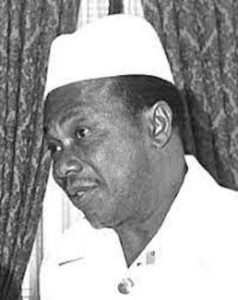
William Tobert Jr.
*William Tolbert Jr. was born on this date in 1913. He was a Black Liberian politician.
William Richard Tolbert Jr. was born in Bensonville, Liberia, to William Richard Tolbert Sr. and Charlotte Augusta Tolbert, nee Hoff, of Cape Mount, Liberia. The Tolbert and Hoff families were Americo-Liberian families of African American descent, and the Hoff family originated from Virginia. His father was the son of Daniel Frank Tolbert, a former American slave from South Carolina who emigrated to Liberia in the Liberian exodus of 1878. The Tolbert clan was one of the largest Americo-Liberian families in Liberia.
He attended Bensonville Elementary School, Crummell Hall Episcopalian High School and graduated summa cum laude from the University of Liberia in 1934. He married Victoria A. David of Americo-Liberian and Vaidescent, with whom he had eight children. Tolbert was first elected to the House of Representatives in 1943 and served until being elected Vice President. A Baptist minister, in 1965, he became the first African to serve as President of the Baptist World Alliance and was also a member of the Phi Beta Sigma fraternity.
He became Grand Master of the Masonic Order of Liberia. Following Tubman's death in 1971, Tolbert succeeded him as President. To the outside world, the peaceful transition seemed to signal political stability in Liberia, which was remarkable in Africa, with political turmoil being the norm. However, Liberia was a one-party state with limited civil liberties, and the judiciary and legislative branches were subservient to the executive branch. Upon becoming President, Tolbert initiated some liberal reforms. Though he was re-elected in 1975, his government was criticized sharply for failing to address the deep economic disparities between different sectors of the population, notably the Americo-Liberians, who had dominated the country since independence, and the various indigenous ethnic groups that constituted most of the population.
Because Tolbert was a member of one of the most influential and affluent Americo-Liberian families, everything from cabinet appointments to economic policy was tainted with allegations of nepotism. Thanks to his father, who spoke Kpelle, Tolbert was the second Liberian President, after President Stephen Allen Benson, to speak an indigenous language. He promoted a program to bring more indigenous persons into the government. This initiative caused a lot of chagrin among Americo-Liberians, who accused Tolbert of "letting the peasants into the kitchen." Indeed, it lacked support within Tolbert's administration. While the indigenous majority felt the change was occurring too slowly, many Americo-Liberians thought it was too rapid. Despite following Tubman's 27-year presidency, Tolbert refused to follow his predecessor's hold on the office until death.
He successfully worked for a constitutional amendment to bar the President from serving more than eight years in office. In 1976, he vowed fierce opposition to members of the Legislature who sought to repeal the amendment and again permit what Tolbert called an "evil tradition." Three years later, when True Whig partisans petitioned him to seek the amendment's repeal, he replied that their statement would only encourage him in his previous position: "I will serve my country as long as I have lived. I do not have to [be?] President to do so." In March 1980, Tolbert ordered the banning of the PAL and had Gabriel Bacchus Matthews and the rest of the organization's leadership arrested on charges of treason. In the early hours of April 12, 1980, 17 non-commissioned officers and soldiers of the Armed Forces of Liberia led by Master Sergeant Samuel Doe launched a violent coup d'état; all of them were "indigenous" Liberians who later became the founding members of the People's Redemption Council, the governing body of the new regime.
The group entered the Presidential palace and killed Tolbert, whose body was dumped into a mass grave with 27 other victims of the coup. A crowd of angry Liberians gathered to shout insults and throw rocks at the bodies. Tolbert's body was later moved to a spot in Monrovia's Palm Grove Cemetery, not far from the bodies of those killed in the Rice Riots. By the end of the month, most of the cabinet members of the Tolbert administration had been put on trial in a kangaroo court and sentenced to death. Many were publicly executed on April 22 at a beach near the Barclay Training Center in Monrovia.
Only four Tolbert cabinet heads survived the coup and its aftermath; among them was the Minister of Finance, future president Ellen Johnson Sirleaf. Undisputedly, Tolbert was dead by the end of April 12, 1980, the day of the coup d’état. There are competing stories as to the time and manner of his death. Steven Ellis, in his book Mask of Anarchy, says the President was found sleeping in his office, where the soldiers killed him, while Ellen Johnson Sirleaf's biography, This Child Will Be Great, says Tolbert was seized and killed in his bed.